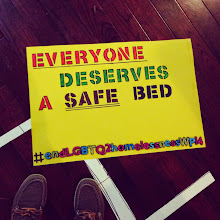

I recently had the opportunity of presenting at the National Forum on Homelessness in Montreal. The Forum invited community based organizations, public institutions, and elected representatives from all over Canada to exchange on different important themes regarding homelessness. Over a day and a half, a large group of people exchanged ideas and thoughts on practices of intervention.
I presented on the panel entitled “Using Art in Intervention”. My talk focused on the power of Digital Storytelling and how research has traditionally viewed people who are homeless as the “subjects” in research, rather than the “experts”. I spoke about our culture’s obsession with controlling which people are granted the authority of being acknowledged as producers of knowledge and how only certain people are given such authority. However, when you put a video camera or a digital camera in the hands of people with lived experiences of homelessness and you ask them to show you what they know, to give a glimpse into the real world experience of homelessness, a lot of powerful things happen:
-It recognizes people with experiences of homelessness as the “experts” of their experiences and allows their lived experiences to inform strategies for solutions to homelessness;
-It validates those involved in sharing their stories as the “knowledge makers”;
-It interrogates the traditional research notion of ‘us’ and ‘them’;
-It encourages solidarity building
-It reflects the diversity of experiences, bodies, and voices in homelessness;
-And of course it helps break down people’s stereotypes of homelessness.
I suggested that whether you are using art or digital storytelling with participants in your research or as an art therapy tool in social service programs, the process of art making and/or digital storytelling for individuals with lived experiences is therapeutic and empowering. It encourages self-expression, communication, exploration, and social justice.
But, as much as I encourage the use of art and digital storytelling with participants, I think it is crucial for researchers to spend time thinking about authenticity and how to be more authentic in their work.
I believe that in a journey as personal as digital storytelling, researchers and social support providers need to think about what they are asking people to share and be willing to share their story as well.
It’s time for our culture to shift how it understands what knowledge is and who is given the power of producing it.
I would like to see more storytelling from those with lived experiences of homelessness and more listening from our society, because maybe when that happens, we will actually be able to come up with strategies to end homelessness.
